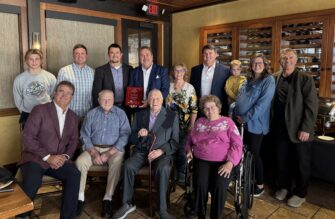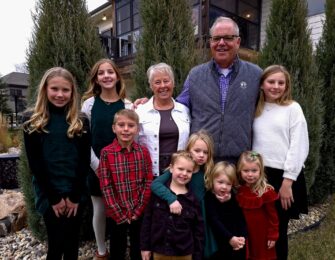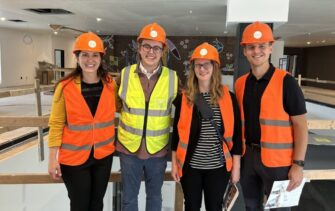From content to connection, 2024 brings year of support for family businesses
Recent News
Father, son build on legacy in plumbing, heating business
Through more than 70 years and multiple generations, Redlinger Bros. Plumbing & Heating Co. has navigated through both family and industry transitions.
In post-World War II Watertown, brothers Clark and Howard Redlinger reopened the family plumbing and heating business originally started by their father, Orson.
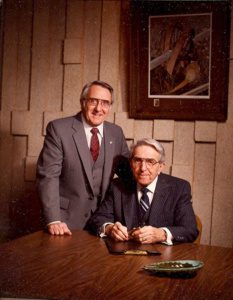
That was in 1946. Decades later, Redlinger has added offices in Aberdeen, Sioux Falls and Yankton, and become a full-service mechanical contracting firm, specializing in mechanical design and drafting, residential service and repair, and commercial, industrial and institutional construction.
Clark’s son, Jim, joined the firm in 1981 and serves as president.
Jim’s son, Adam, grew up in Sioux Falls and is a 2012 graduate of the USD Beacom School of Business. He joined Redlinger after graduation and is an estimator/project manager.
What would you say your business is known for?
Adam: Redlinger Bros. is known as a family business providing high-quality mechanical work to customers of all different sizes and industries. The company is built from a foundation of honesty, hard work and craftsmanship, which started from the first-generation owners, (Clark and Howard).
What do you think people might be surprised to learn about Redlinger?
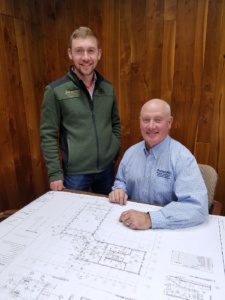
Adam:Though we provide mechanical work for the upper Midwest, during the late ’70s and early ’80s, we worked in Kansas, Oklahoma and even out in North Carolina. During this era, we worked closely with rubber-molding facilities, which stretched our service area from the neighboring states to the East Coast.
Adam, had you planned to join the family business throughout your college training? What made you decide to do it?
Adam: It has always been in the back of my mind. During my freshman year at USD, the plan became much more formalized. My older brother just finished his undergrad and planned to move to Minneapolis. My brother, Clark, and I had discussed the plan that one of us would go back to the family business. Making the decision was not difficult to make because I grew up working for the company every summer. Even before college, I always considered the possibility.
One key factor for me was my grandfather. He was very much an idol to me when I was younger. Clark left lasting impressions on anyone he worked with. To this day, I still meet people complimenting their interactions they had. I feel pride when I hear these stories and just working for the family business. I spent my summers in high school working in the shop with our manager and shop staff, mainly helping with inventory, and servicing tools and equipment. At 18, I started working in the field (commercial construction) each summer.
In the summer of 2012, I shadowed one of our project managers/estimators. From the shop employees, the service technicians, field crews to the office staff, these employees that work at Redlinger Bros. today are the ones that taught me everything I know. Our company is successful today because of the people that showed dedication to the company’s future. Seeing employees working for Redlingers for decades made it an easy decision for a career path. The atmosphere of the company helped pull me into this business because people really do treat each other like one big family. If I didn’t work for Redlinger Bros., I still think I would have gone into the construction industry. I like building things and the challenges that come with the industry we are in.
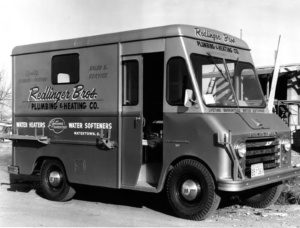
Jim, what approach did you take integrating Adam into the business?
Jim: I wanted Adam to have exposure to all parts of our business: service, retail and construction. Adam began his Redlinger Bros. employment at our home office in Watertown, working summers in the shop, which consisted of working in the retail and service departments. During Adam’s summers during his college years, he worked out of our Yankton office, which exposed him to the commercial construction world. The summer prior to graduation, Adam worked with one of our project managers and our CFO to give him the office experience.
You recently participated in a family business retreat through the Prairie Family Business Association. What kind of value did you find in that?
Jim: Having been involved with the Prairie Family Business Association since 1992, I’ve witnessed the importance – OK, horror stories – of what can happen if you don’t make plans and communicate with the next generation. The retreat allowed me an opportunity to really go into detail on my time line to retirement and what my vision is for the future of Redlinger Bros. and what their responsibilities would be. I was pleased to find out the boys (Adam and stepsons Jeremy and Ryan Seeman) had already had discussions about their vision of Redlinger Bros.
The retreat was a perfect setting to totally concentrate on just the family business without any interruptions. You have the opportunity to share your experiences and hear about other families’ experiences in a world-class location, Paul Nelson Farm.
Adam: The retreat was rewarding for our family business because it allowed us to sit down and fine-tune our plan, have an open and honest discussion about our issues at hand and then what we want to do to achieve solutions. One blessing we have is that our family gets along very well, so the retreat was filled with transparent conversations, which helps tremendously. I know this isn’t the case for all families, so we are very fortunate in that sense. The retreat speakers add to the fluidity of our gatherings, providing guidance based on topics and experiences they have been a part of that maybe we didn’t think to cover. The breakout group sessions help put the main issues under a microscope and fine-tune what we need to do to get from point A to B. Such things as succession planning, future responsibilities of family members and ownership are all things that people don’t typically want to discuss. These type of meetings make both the current owners/managers and upcoming generation much more comfortable knowing what is at stake and what we need to do to accomplish a smooth transition.
You also are involved in peer groups through the association. Why did you choose to participate in those, and what kind of benefit have you seen?
Jim: I originally joined to discuss various transition options. What the affinity group supplied was a priceless resource of information, sharing of experiences and a sounding board for ideas. The group becomes a part of your business because of the resource value it brought.
Adam: I was interested in joining an affinity peer group because Jim spoke of the value he gained from being a member. Once PFBA had enough people that were in similar situations in their careers, we formed a group of the incoming generation, and we really clicked. The group I work in is going on about two years, but since our first meeting, the dialogue in our meetings are free-flowing and a very positive place to discuss business and personal challenges. I find real value in sharing stories. The members know they can discuss topics of any subject, and the others will use their own experiences to assist in making the right decision or help guiding them to make one in the future. I go to these meetings with the goal that I want to grow my business and personal knowledge. I feel that our group members share a parallel mind-set of being involved in the community and caring about the future of the businesses and communities that they serve. It is something you can’t experience without joining a group like this. It adds value I would not find through other networking groups or business gatherings.
What’s next for Redlinger? What are you hoping the business is like five years from now?
Adam: Redlinger Bros. will continue to provide quality mechanical contracting with the vision to grow our reputation and stay ahead of the ever-changing industry we are a part of. I see growth in our region mainly in health care, educational and manufacturing. In five years, I would like to see a more-efficient building process with even more prefabricated work being used. A push for emphasizing construction careers would be ideal, but I think that is going to be an ongoing battle in my lifetime. I believe this emphasis will have to be accomplished by contractors of this region and the education system working hand in hand. The skilled labor shortage is a major issue for the entire construction industry, and I see this being one of the biggest challenges my generation will face.


